Does the idea of working outside and with your hands sound more appealing than the traditional 9 to 5? If so, you might consider working with air conditioning systems. The industry is growing fast and offers tons of opportunities for advancement. It also keeps you active and away from the screen.
If you want to learn how to become an AC technician, find the right training courses, and acquire the skills needed to start working in this field, read on.
There’s more to being an AC Technician than you might think. There are specific skills that AC Technicians have to learn to accomplish their responsibilities, but the hard work pays off.
The median annual salary of AC technicians, mechanics, and installers is $50,590, with the top ten percent of earners pocketing over $80,000 per year.
Below, we’ll introduce four simple steps to help propel your journey toward becoming an AC technician.
Table of Contents
What Does an AC Technician Do?
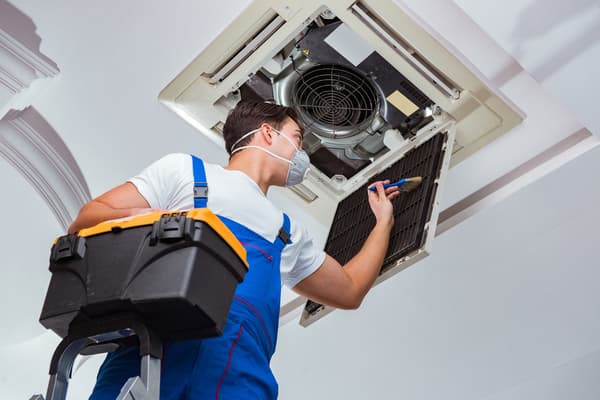
Before we dive in, we should talk about what distinguishes AC technicians from HVAC employers. While HVAC technicians install, repair, and maintain heating, ventilation, and air-conditioning systems, AC technicians work only on air-conditioning systems.
Additional job responsibilities include:
- Installing air-conditioning and climate control systems
- Troubleshooting and repairing HVAC systems and components
- Performing routine maintenance like changing air filters
- Installing electrical controls and wiring
- Performing pressure and temperature tests
- Keeping a record of servicing and maintenance performed
Difference Between HVAC and HVAC/R

Four Steps to Becoming an AC Technician

If you want to become an HVAC technician or an AC technician, you can choose from multiple education/training options. While some training programs include general HVAC concepts, others focus more strictly on AC technology.
START YOUR HVAC CAREER
Earn your degree in HVAC from NEIT and begin your new career path today!
ASSOCIATE'S DEGREE
Get a High School Diploma or GED
Most AC technician training programs and apprenticeships need at least a high school diploma or GED., though some programs may accept individuals without this credential.
In addition to helping you meet the enrollment criteria, a high school education will provide you with a foundation in mathematics and science, which can come in handy during AC technician training.
You can also take vocational courses in your high school to improve your mechanical skills, dexterity, and other necessary skills.
Choose an Education or Apprenticeship Program

After completing high school, you can choose a post-secondary AC technician education program or an apprenticeship.
AC technician degrees include certificate programs and associate degrees.These programs are often offered at trade schools or community colleges and take anywhere from 12 to 24 months to complete.
During your program, you’ll gain the knowledge and technical skills to become an AC technician through classroom instruction and practical lab hours. After completing an education program, you can apply for entry-level AC technician jobs.
An associate degree program like the New England Institute of Technology’s Refrigeration, Air-Conditioning, and Heating, AS includes comprehensive theory and practices in a hands-on laboratory setting.
The New England Institute of Technology curriculum typically lasts about 18 months. These programs can help reduce the time required for getting your first job.
Obtain Certifications and Licensure
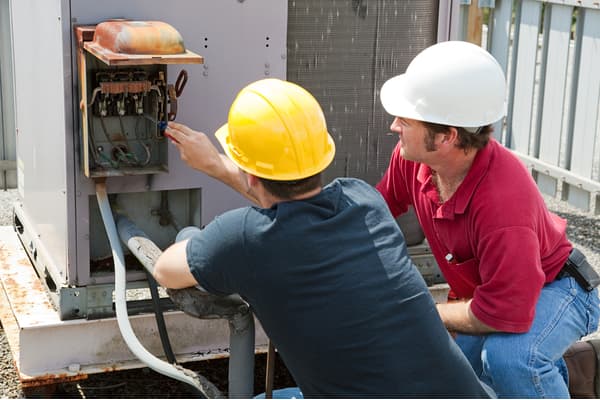
The Environmental Protection Agency (EPA) Section 608 certification remains a standard requirement in the HVAC industry. Under federal regulations, technicians who work with HVAC equipment that may release refrigerants in the environment must possess an EPA certification.
Many air-conditioning systems use refrigerants like R410a that may impact the ozone layer, which is why obtaining an EPA 608 certificate is essential.
You must also apply for an AC/HVAC technician licensure according to your state and local licensing requirements. Typically, you’ll need proof of education/training and work experience to apply for a license. Once you complete the initial requirements, you must pass a competency exam to obtain your AC technician license.
Read our guide on how to get HVAC certified.
Pursue Advanced Certificate Programs
Many professional organizations such as HVAC Excellence, North American Technician Excellence (NATE), Associated Builders and Contractors (ABC), and Refrigeration Service Engineers Society (RSES) offer advanced certifications to help you propel your HVAC career.
For instance, you can take an advanced HVAC certificate program in gas heating systems or heat pumps to demonstrate your skills in the trade.
Although these certificates are not mandatory, they can help you stand out as an accomplished AC technician.
AC Technician Education
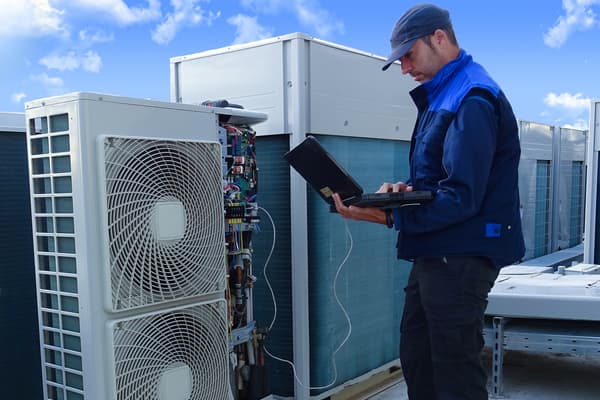
Many employers prefer technicians who have completed a formal education program in Heating, Air-conditioning, and Refrigeration. You can enroll in a certificate program or associate degree to meet the education requirements and gain the necessary skills.
Education programs for AC technicians may include any of the following majors:
- Heating and Air-conditioning
- Heating, Ventilation, and Air-conditioning
- Refrigeration and Air-conditioning
- Refrigeration, Air-conditioning, and Heating
- Heating, Ventilation, Air-conditioning, and Refrigeration
These programs are generally offered across community colleges, vocational schools, and technical colleges.
The course curriculum in an AC technician education program includes HVAC equipment design and repair, temperature and pressure measurement, electrical circuits, refrigeration fundamentals, blueprint reading, mechanical drawing, and so on.
AC Technician Licensure and Certification
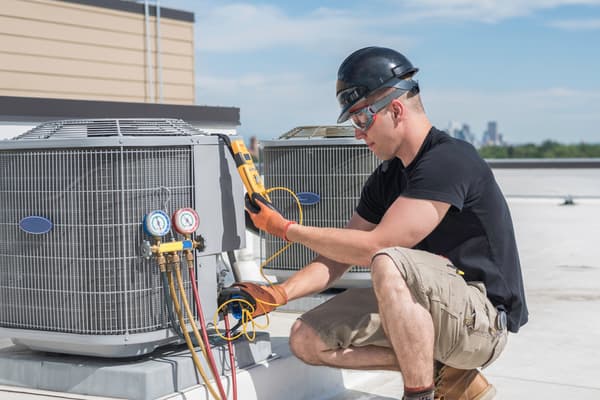
Certifications and licensure are crucial for any trade job, as they ensure that a professional possesses the correct knowledge and skills to handle complex aspects of their trade. Let’s take a closer look at the licensing and certification requirements for AC/HVAC technician jobs.
Licensing
There are no national licensing requirements for AC technicians. Some states and local authorities require AC technicians to obtain licensure before applying for full-time jobs.
Certification
There are two types of certifications for AC technicians: Mandatory and Optional.
Besides the EPA 608 certificate, most certifications are optional. However, getting a certificate helps you stay updated with the latest technology, gain expertise in core domains, and improve your higher wages and job growth prospects.
Skills and Personality Traits of HVAC Technicians

Here’s are some of the essential skills and personality traits for a successful career:
- Knowledge of domestic and commercial AC troubleshooting and repair
- Hands-on experience on pneumatic and digital control systems
- Knowledge of compliance with safety procedures
- Preventive and corrective maintenance procedures
- Cost estimation
- Installation of new AC systems
- Knowledge of safe handling and disposal of refrigerants
- Maintenance and repair of electrical wiring, circuitry, and components
- Ability to work with testing equipment for air quality, pressure, and temperature measurement
- Blueprint reading, sketching, and design calculations
As AC technicians work in a practical-intensive environment, they should possess the following personality traits to excel at their job:
- Hand-eye coordination
- Attention to detail
- Manual dexterity
- Physical strength
AC Technician: Career Path, Salary, and Job Outlook
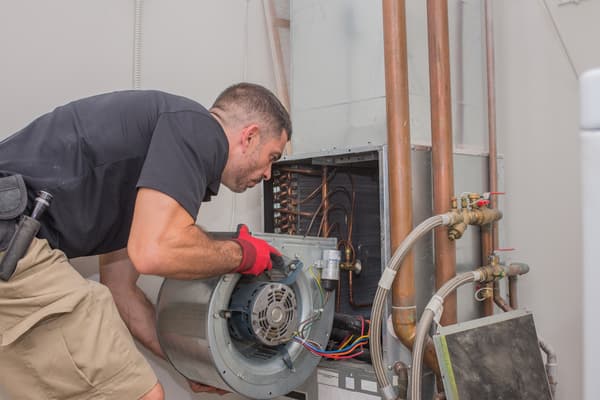
Many AC technicians start with apprenticeships or entry-level positions. After gaining adequate experience, an AC technician can work as a supervisor to train and manage a team of new technicians.
AC technicians can progress to managerial roles with about 15 years of work experience. Alternatively, you can work independently or start your HVAC business.
Career Outlook
According to the Bureau of Labor Statistics, the employment of Heating, AC, and Refrigeration mechanics will increase by 5 percent from 2020-30, adding about 19,000 new jobs.
Most commercial and residential projects require the services of air-conditioning technicians. The construction industry will drive significant employment growth.
Salary and Wages
HVAC technicians earn median wages of about $24.32 per hour or $50,590 annually. The top 10 percent of highest-earning HVAC professionals have a median salary of more than $80,820 per year. Education, skills, experience, and job location typically influence AC technician salaries.
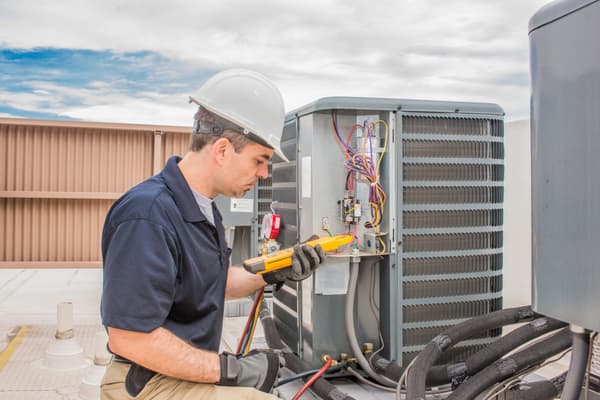
Top-Paying States
Rhode Island’s average HVAC technician salary is $61,790 per year, much higher than the national average. Many other states offer excellent salaries to HVAC technicians. Here are the top five states with the highest average salary:
- Alaska: $79,630
- District of Columbia: $73,460
- Hawaii: $65,640
- Washington: $65,180
- Massachusetts: $64,760
States with the Highest Job Concentration
Today, Rhode Island employs about 1,250 HVAC technicians at an employment rate of 2.82 per 1,000 jobs. Larger states like California and Texas offer an even higher concentration of HVAC technician jobs. Here are the top five states with the highest job concentration as per the Bureau of Labor Statistics:
- Florida: 33,210
- California: 32,410
- Texas: 28,010
- New York: 16,730
- Pennsylvania: 14,900
Top Employers in the Field
According to Zippia.com, the employers listed below offer the best salaries, benefits, and work experience:
- Johnson Controls
- United States Marines
- John Moore
- Cool Aid A/C and Heat
- Conn’s
- Alisto Engineering Group
- Chas Roberts Air Conditioning
- Star Service
- The Warehouse
- Lifetime Entertainment Services
Benefits of Becoming an AC Technician
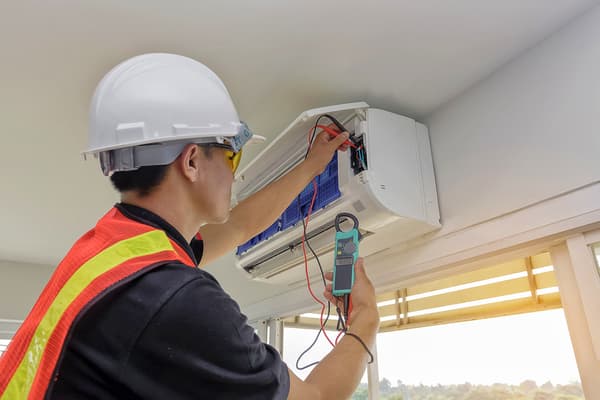
HVAC is one of the highest-paying trades, offering excellent wages and benefits. You can also start your business or work independently at your own pace.
Besides the monetary perks, an AC technician will enjoy plenty of opportunities for growth. Since HVAC remains a constantly evolving field, you’ll always find something new to learn.
Conclusion
An AC/HVAC technician career offers excellent salary and career growth prospects. You can choose a certificate program, associate’s degree, or apprenticeship to become an AC technician.
The New England Institute of Technology’s Associate of Science degree in Refrigeration, Air-conditioning combines two distinct but interconnected areas: refrigeration/air conditioning and heating to help you become an AC/HVAC/HVACR technician.
You’ll learn the theory and practices of refrigeration, AC, and heating in a hands-on laboratory setting.
START YOUR HVAC CAREER
Earn your degree in HVAC from NEIT and begin your new career path today!
ASSOCIATE'S DEGREE
FAQs
What Is the Difference Between HVAC and HVACR Technicians?
HVACR technicians perform similar job responsibilities as HVAC technicians. However, they also gain the knowledge and skills of domestic and industrial refrigeration systems, thus diversifying their services.
What Does an AC Technician Do?
An AC technician helps install, repair, and maintain domestic and commercial heating and cooling systems. They help replace and repair worn-out parts and components, perform corrective and preventive maintenance, and repair electrical control systems.
How Much Do AC Technicians Earn?
The median salary of AC technicians in the USA is about $50,590 per year or approximately $24.32 per hour.
How Long Does It Take to Become an HVAC Technician?
HVAC technician training programs include certificate programs, associate degrees, and apprenticeships. A certificate course takes about 6 to 12 months. An HVAC degree at a trade school or community college through an associate degree program takes two years.
The New England Institute of Technology curriculum typically lasts about 18 months.
Apprenticeship programs run for 3 to 5 years. After completing formal education/training, you must apply for licensure/certification. Once you obtain your license, you can apply for entry-level jobs.

